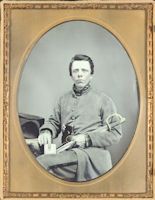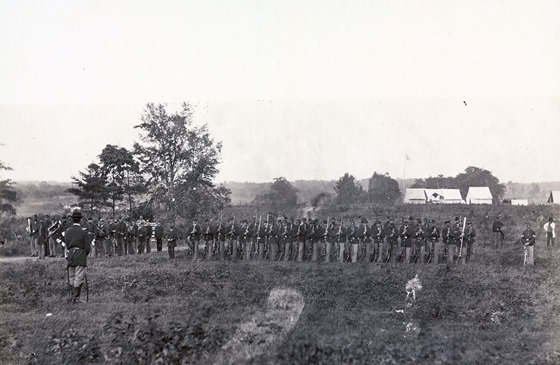Headquarters, Third Brigade, First Division,
Fifth Army Corps, Crittenden’s Mill, Va., June 8, 1863.
Dear Sister L.:—
I have no letter of yours to answer, but having nothing to do and knowing that you are always glad to hear from me, perhaps I can’t do better than to spend an hour jotting down for your amusement a few incidents by the way. Life at headquarters is pleasant on one account—it gives me a better opportunity to see and talk with the people of the country than I had in the regiment.
You will see by this that we have again moved. Since the 27th ult. we have been engaged in guarding the river at different points above Fredericksburg. Crittenden’s Mill is some twenty miles above town and two miles back of the river. Ellis’ Ford and Kempel’s Ford are near, and our brigade is ordered to guard these crossings and watch the enemy on the other side. Reports of the observations have to be sent to Division headquarters every four hours of the day and night. Headquarters are at the house of a certain widow James. She has three sons in the rebel army and is a pretty loud secesh herself. My bivouac is in one of the old lady’s tobacco houses, and there I am writing this at present, so if it smells of tobacco don’t charge it to my habits. On the road up here we stopped one night at the house of a Mr. Imbray. He was a cripple and at home, but made no secret of his being secesh to the backbone. “I belong to the South,” said he, “and my heart is with the South. If I was with the army I should shoot at you with all the power I had, but, meeting as we do, I shall not allow any difference of opinion to influence my treatment of you.” (Very considerate, wasn’t he, when we had the force there to enforce respect?) But it wasn’t of him I meant to speak, but of his daughters. There were two, one a lady of “uncertain age,” and the other not. The “not” was about eighteen, and the bitterest, rabidest, outspokenest, cantankerous-est specimen of secesh femininity I’ve come across yet. She had no objection to talk, and she commenced at me when she saw my flag, with, “Is that a Yankee flag?” “Well, the Yankees use it,” said I, “but here’s the Yankee flag,” and I unrolled a new silk “star spangled” and waved it over her head. “Don’t you think,” said I, “that that’s a prettier flag than the ‘stars and bars?'” “No, indeed! I can’t see it, sir—no, sir—give me the Confederate flag. I don’t want none o’ yer gridirons about me.” Finally after some bantering we dropped the subject and I induced her after a chaffer to sell me two quarts of milk for half a dollar, and she offered me half a loaf of rye bread for the same price, but I preferred hard tack. “We’re no way particular about prices with you all,” she said. “So I see,” meekly replied I. Next morning we were going, and I was bound to have some fun first, so I opened by asking her if she didn’t sometimes feel lonesome with none of the young men about. “Well, sir, not lonesome enough to care to see you Yankees about.” (Repulse.) “Have you any relatives in the rebel army?” “I have two brothers and a lover in the Confederate army.” (Cool—that about the lover.) “Then Yankee boys stand no chance in your good graces?” “No, sir, I hate the sight of them.” (Cooler yet.) “Why, I don’t think you are a secessionist.” (Tactics.) “Well, I am, sir, I am true to the South.” (I wish I could write their pronunciation of South; it beats all the down-east you ever heard of.) “No, you are a Yankee, at least a Yankee secesh.” “No, indeed, sir, nary drop o’ Yankee blood in my veins, I tell you, sir.” “Oh, but you are, begging your pardon, and I’ll prove it to you.” “No, sir, you can’t do that, sir; better tell that to some one else. If I had any Yankee blood in me I’d let it out. Yes, indeed, I would.” “Well, you acknowledge that a Yankee thinks more of property and money than anything else, don’t you?” “Yes, sir, I’ve heard they do, and I believe it.” “Yes, well, you’re a Yankee then. If you were a secesh you would go with the South and help them. True secesh women do that, but your family have some property here and you stay to take care of it and let the South get along the best she can. You are a genuine Yankee, say what you please. You wouldn’t go and share the fortunes of your ‘Sunny South,’ but you must stay to keep the Yankees from destroying the property.” Oh, how she did sputter! “To think that she should be called a Yankee!” I guess she’ll get over it.
Down on the bank of the river I went into a house and met a young married woman with a baby in her arms. She had been pretty once and it was not age that spoiled her beauty, but care. “Can you sell me a pie, or something good for my dinner?” said I. “A pie! sir.” said she. “Well, now, sir, if I was to tell you that I have not tasted or seen a piece of pie for more than a year, would you believe me?” “I certainly should if you said so. Of course I couldn’t doubt a lady’s word.” “Sir, ‘fore God it is the truth. I have only been married ’bout a year, and my husband, who was an overseer, came on to this place after the fruit was all gone, and I’ve had no fruit. I haven’t seen a bit of sugar, nor coffee, nor tea for nigh eight months, I reckon,” and she went on and gave me such a story of struggles to keep alive, to get enough to keep from starving, as made all the hard times I have ever seen seem like a life of luxury. I did pity her. On such as she, the poor whites of the South, the burden of this war is heaviest. She had but little sympathy for the South or North either. She cared but little how the war ended, so it ended soon. Poor woman, she understood but little of the nature of the contest. She sent a little darky girl to bring in a pan of milk. The girl came with it balanced on her head, not touching her hands. I remarked how strange it seemed to me to see everybody in the south carry pails on their heads. “Why,” said she, “how do you-all carry ’em?” “In our hands.” She laughed. “I have to tote all my water up a steep bank, and, if I toted it in my hand, it would pull me over.” She gave me some milk, and by the time I had eaten my dinner the colonel came back from the lines, and I mounted my horse and came back to camp.
Strawberries are ripe and I get a few. No more news from Fredericksburg.












